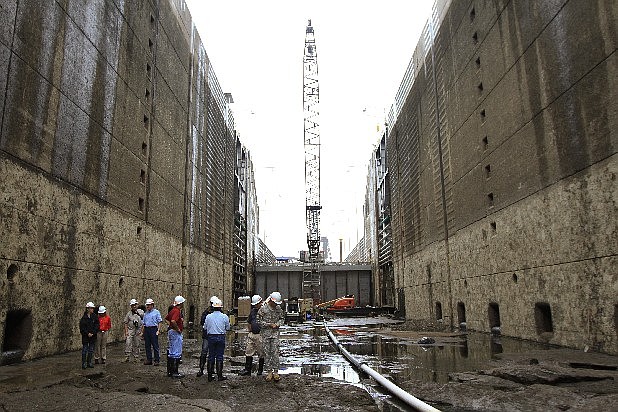Remember Chuck Fleischmann's "fixed" funding for the Chickamauga lock?
Perhaps he should have gotten serious about seeking a way to fix the stalled construction on a new lock four years ago when he was elected to the first of his two terms in the U.S. House of Representatives. Now a gate failure at the Chickamauga lock will shut down river goods passage on 318 miles of the 652-mile-long Tennessee River -- for what's hoped will only be three weeks. It's the harbinger of problems we've known about for years: The aging lock has very few more years left before safety concerns force its permanent closure.
Don't for an instant think this is not a big deal or is just a problem for the region's recreational boaters. That is wrong, wrong, wrong.
The Tennessee River, and this lock in particular, carries products that are simply too heavy or too risky for roads and bridges. Electric power plant parts travel the river and pass through the locks: When the Tennessee Valley Authority built the John Sevier Combined Cycle power plant in upper East Tennessee, the 750,000-pound generator and the 500,000-pound turbine could only be delivered there by water -- and through the Chickamauga lock. The same was true for Sequoyah Nuclear Plant's replacement steam generator some 18 months ago. And it could be true again for the proposed Oak Ridge small modular reactors of the future.
Yet even in the summer of 2014, long after work stopped on our replacement lock and while stimulus-purchased parts were still arriving here and being mothballed, Fleischmann still wouldn't commit to supporting a diesel tax that barge owners were begging for to help get construction restarted on the larger, newer lock.
The problem was that Fleischmann, when he took office in 2011, signed the no-new-taxes pledge by the tea party's Grover Norquist. And even though Fleischmann has termed the tax "a user fee" and said that the Norquist people have told him a user fee would be OK, he still hasn't made the move to try pushing it forward in the House of Representatives.
In fact, the one step forward that Fleischmann has touted about how he "fixed" the funding problem was engineered and pushed through by Tennessee Republican Sen. Lamar Alexander when he helped change the funding formula for the Inland Waterways Trust Fund which pays for these projects. With Alexander leading, Fleischmann, the sole Tennessee representative on the House Appropriations Committee, finally in May worked to get the votes in the House for that funding formula change. But both Alexander and Fleischmann said they knew the funding formula change was not enough to get work started again. A second stream of revenue would be needed to pump up the Inland Waterways Trust Fund which is funded by both barge fuel taxes and federal appropriations.
Alexander backed the barge industry-pushed plan to raise the fuel tax on barges by 6 to 9 cents a gallon. He also called it a "user fee," and said that without it, the Army Corps of Engineers probably won't have enough funds to restart work after the corps had already spent about $200 million on the project.
It wasn't until an election debate Monday that Fleischmann finally said -- three hours after the gate problem forced the Corps to close the lock -- that he now is willing to support that "user fee."
"This is appalling on so many levels that it leaves one nearly speechless," said Mary Headrick, the Democrat trying to unseat Chuck Fleischmann in Tennessee's 3rd District after the lock closure was made public the next day. "Our current representative does not understand the urgency of the lock issue nor how to interact with others to achieve funding."
And she's right. We can only hope it's not too late. The lock, built in the 1930s and dedicated in 1940, suffers from concrete growth and deterioration in the lock chamber. Yet it is the only gateway to the upper Tennessee River from Chattanooga to Oak Ridge and Knoxville, including all navigation to the U.S. Department of Energy's facilities at Oak Ridge and two nuclear power plants that serve us.
Corps officials now say what first was estimated to be a $375 million replacement project now has ballooned to $860 million, thanks to delays. Completion will now cost $674 million. That means the cost has already more than doubled.
So much for not costing us any new taxes, Chuck.

